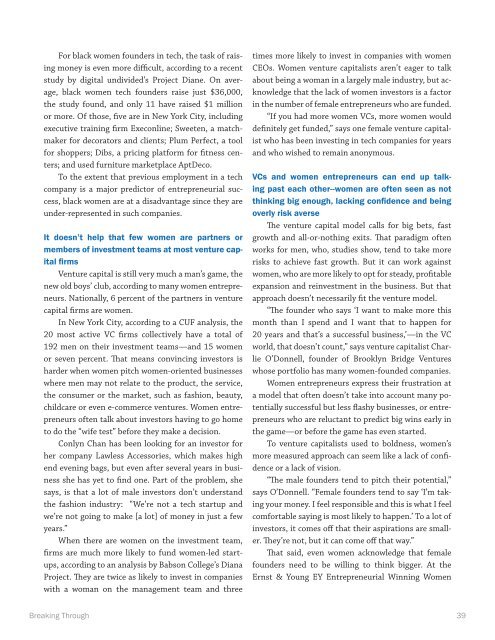BREAKING THROUGH
YWkgl
YWkgl
Create successful ePaper yourself
Turn your PDF publications into a flip-book with our unique Google optimized e-Paper software.
For black women founders in tech, the task of raising<br />
money is even more difficult, according to a recent<br />
study by digital undivided’s Project Diane. On average,<br />
black women tech founders raise just $36,000,<br />
the study found, and only 11 have raised $1 million<br />
or more. Of those, five are in New York City, including<br />
executive training firm Execonline; Sweeten, a matchmaker<br />
for decorators and clients; Plum Perfect, a tool<br />
for shoppers; Dibs, a pricing platform for fitness centers;<br />
and used furniture marketplace AptDeco.<br />
To the extent that previous employment in a tech<br />
company is a major predictor of entrepreneurial success,<br />
black women are at a disadvantage since they are<br />
under-represented in such companies.<br />
It doesn’t help that few women are partners or<br />
members of investment teams at most venture capital<br />
firms<br />
Venture capital is still very much a man’s game, the<br />
new old boys’ club, according to many women entrepreneurs.<br />
Nationally, 6 percent of the partners in venture<br />
capital firms are women.<br />
In New York City, according to a CUF analysis, the<br />
20 most active VC firms collectively have a total of<br />
192 men on their investment teams—and 15 women<br />
or seven percent. That means convincing investors is<br />
harder when women pitch women-oriented businesses<br />
where men may not relate to the product, the service,<br />
the consumer or the market, such as fashion, beauty,<br />
childcare or even e-commerce ventures. Women entrepreneurs<br />
often talk about investors having to go home<br />
to do the “wife test” before they make a decision.<br />
Conlyn Chan has been looking for an investor for<br />
her company Lawless Accessories, which makes high<br />
end evening bags, but even after several years in business<br />
she has yet to find one. Part of the problem, she<br />
says, is that a lot of male investors don’t understand<br />
the fashion industry: “We’re not a tech startup and<br />
we’re not going to make [a lot] of money in just a few<br />
years.”<br />
When there are women on the investment team,<br />
firms are much more likely to fund women-led startups,<br />
according to an analysis by Babson College’s Diana<br />
Project. They are twice as likely to invest in companies<br />
with a woman on the management team and three<br />
times more likely to invest in companies with women<br />
CEOs. Women venture capitalists aren’t eager to talk<br />
about being a woman in a largely male industry, but acknowledge<br />
that the lack of women investors is a factor<br />
in the number of female entrepreneurs who are funded.<br />
“If you had more women VCs, more women would<br />
definitely get funded,” says one female venture capitalist<br />
who has been investing in tech companies for years<br />
and who wished to remain anonymous.<br />
VCs and women entrepreneurs can end up talking<br />
past each other--women are often seen as not<br />
thinking big enough, lacking confidence and being<br />
overly risk averse<br />
The venture capital model calls for big bets, fast<br />
growth and all-or-nothing exits. That paradigm often<br />
works for men, who, studies show, tend to take more<br />
risks to achieve fast growth. But it can work against<br />
women, who are more likely to opt for steady, profitable<br />
expansion and reinvestment in the business. But that<br />
approach doesn’t necessarily fit the venture model.<br />
“The founder who says ‘I want to make more this<br />
month than I spend and I want that to happen for<br />
20 years and that’s a successful business,’—in the VC<br />
world, that doesn’t count,” says venture capitalist Charlie<br />
O’Donnell, founder of Brooklyn Bridge Ventures<br />
whose portfolio has many women-founded companies.<br />
Women entrepreneurs express their frustration at<br />
a model that often doesn’t take into account many potentially<br />
successful but less flashy businesses, or entrepreneurs<br />
who are reluctant to predict big wins early in<br />
the game—or before the game has even started.<br />
To venture capitalists used to boldness, women’s<br />
more measured approach can seem like a lack of confidence<br />
or a lack of vision.<br />
“The male founders tend to pitch their potential,”<br />
says O’Donnell. “Female founders tend to say ‘I’m taking<br />
your money. I feel responsible and this is what I feel<br />
comfortable saying is most likely to happen.’ To a lot of<br />
investors, it comes off that their aspirations are smaller.<br />
They’re not, but it can come off that way.”<br />
That said, even women acknowledge that female<br />
founders need to be willing to think bigger. At the<br />
Ernst & Young EY Entrepreneurial Winning Women<br />
Breaking Through 39


